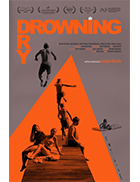Drowning Dry (Seses)
|  Lithuanian director Laurynas Bareisa’s sophomore feature, Drowning Dry (Seses), is a confused drama about two sisters, their husbands, and the fallout from a tragedy that at first appears to be one thing, but is later revealed to be something else. For the first 45 minutes it unfolds like a languid chamber drama as the two couples and the children spend a weekend at a lakeside house and nothing much seems to happen. There are intimations of unhappiness in the two marriages, as the women are clearly dissatisfied with their husbands, each of whom represents a different strand of toxic masculinity. Conversations are clipped, interactions are vexed, and Bareisa underscores the uneasiness by constantly framing the action in ways that are purposefully odd and obscuring. Sometimes the camera slowly zooms in on something, but it often stays fixed in a less-than-ideal position, either missing some of the action or barely glimpsing it beyond an object in the foreground. There is a strict linearity to the story until suddenly there isn’t, when a potential tragedy begins to unfold, but is then cut off right before we discover if it is a tragedy or not. The story then leaps forward in time, suggesting a new tragedy before jumping back in time to before the earlier may-have-been tragedy and replaying some of the same actions even though some of it is inexplicably different (the two wives perform a nostalgic dance routine, but the second time the music is different and the dance moves are slightly different even though the scene immediately preceding it is played exactly the same). What exactly the purpose is to these temporal shenanigans is anyone’s guess, although those who manage to make it through the slow opening half will be hard pressed not to be at least somewhat intrigued by what might be around the corner. The time jumping is gimmicky and confusing, but it also allows Bareisa, who wrote and directed and acted as his own cinematographer, to mix it up and divert our attention. The point seems to be the nature of tragedy and how it affects those in the aftermath, and leading us in one direction that seems overtly conventional only to throw us for a loop and make us figure out what actually happened lights up the proceedings, even if it ultimately fails to land the gut-punch that is so clearly intended. Even if the drama doesn’t entirely work, the cast is quite effective in conveying their characters’ struggles. Gelminė Glemžaitė’s Ernesta is married to Paulius Markevičius’s Lukas, who earns a living as a mixed martial arts fighter (the film opens with him in the ring), much to her consternation as she constantly worries that something will happen to him. Lukas is vicious in the ring but languid outside of it, which means that he and Ernesta have monetary and interpersonal problems. Ernesta’s sister, Justė (Agnė Kaktaitė), is married to Tomas (Giedrius Kiela), who is Lukas’s opposite: physically soft, but financially sound. Bareisa makes it a point to show both men attempting to get sex out of their clearly uninterested wives early on, which makes clear how unhappy everyone is. There is little to be shared between the spouses, which makes the later dramatic tension inevitable. It is too bad that it wasn’t more emotionally gripping, as everything unfolds with a kind of dour fatalism that depresses more than it engages. Copyright © 2025 James Kendrick Thoughts? E-mail James Kendrick All images copyright © Dekanalog |
Overall Rating: 

 (2.5)
(2.5)


